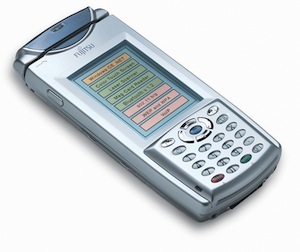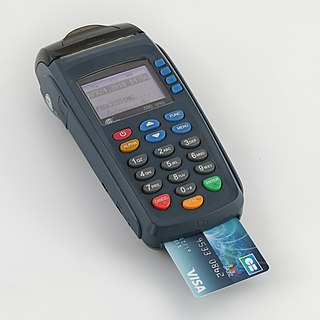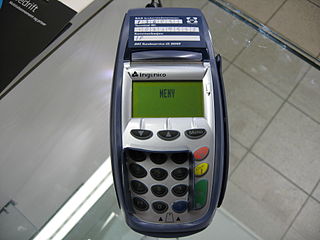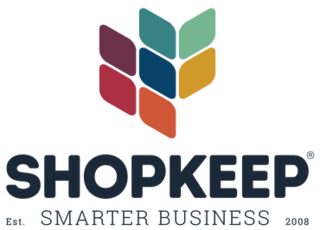 W
WClover is a cloud-based Android point of sale (POS) platform that was launched in April 2012. The company is headquartered in Sunnyvale, CA. Clover was acquired on December 28, 2012 by First Data Corporation. Bank of America Merchant Services was the first to announce it would sell Clover to its merchant base in October 2013. PNC Merchant Services was the second to announce it would sell Clover to its merchant base.
 W
WErply is an enterprise software company focusing on point of sale and inventory management technology. It was founded in Estonia by Kristjan Hiiemaa in 2009.
 W
WThe Fujitsu iPAD is a lightweight handheld device that was introduced by Fujitsu, in 2002. It runs Microsoft's CE.NET operating system. It supports 802.11b wireless LAN to connect wirelessly with other company infrastructure. The device can support inventory management as well as credit card payments. In January 2010, when Apple announced the Apple iPad, there was a naming controversy between the two devices. To settle the trademark infringement allegation, Apple purchased the trademark rights from Fujitsu. Some trademark analysts estimate that Apple paid Fujitsu over US$4 million in exchange for the March 17, 2010 assignment of Fujitsu's iPad trademark rights to Apple.
 W
WIngenico is a France-based company, whose business is to provide the technology involved in secure electronic transactions. Its traditional business is based on the manufacture of point of sale (POS) payment terminals, but it also includes complete payment software and related services, also software for merchants.
 W
WLightspeed is a point-of-sale and e-commerce software provider based in Montreal, Quebec. It was founded by Dax DaSilva in 2005, who also serves as the CEO of the company. It has offices in Montreal, New York, Olympia, Ottawa, Santa Cruz, Ghent (Belgium) and Amsterdam. It offers its services to 23,000 retail, restaurant, and hospitality businesses, across 100 countries.
 W
WPAX Technology is a leading global manufacturer of payment terminals; PIN pads; and Point of sale hardware and software. The company is headquartered in Shenzhen and operates in 5 global regions - EMEA, LACIS, North America, China, and Asia Pacific.
 W
WA payment terminal, also known as a Point of Sale (POS) terminal, credit card terminal, EFTPOS terminal, is a device which interfaces with payment cards to make electronic funds transfers. The terminal typically consists of a secure keypad for entering PIN, a screen, a means of capturing information from payments cards and a network connection to access the payment network for authorization.
 W
WThe point of sale (POS) or point of purchase (POP) is the time and place where a retail transaction is completed. At the point of sale, the merchant calculates the amount owed by the customer, indicates that amount, may prepare an invoice for the customer, and indicates the options for the customer to make payment. It is also the point at which a customer makes a payment to the merchant in exchange for goods or after provision of a service. After receiving payment, the merchant may issue a receipt for the transaction, which is usually printed but can also be dispensed with or sent electronically.
 W
WPoint-of-sale malware is usually a type of malicious software (malware) that is used by cybercriminals to target point of sale (POS) and payment terminals with the intent to obtain credit card and debit card information, a card's track 1 or track 2 data and even the CVV code, by various man-in-the-middle attacks, that is the interception of the processing at the retail checkout point of sale system. The simplest, or most evasive, approach is RAM-scraping, accessing the system's memory and exporting the copied information via a remote access trojan (RAT) as this minimizes any software or hardware tampering, potentially leaving no footprints. POS attacks may also include the use of various bits of hardware: dongles, trojan card readers, (wireless) data transmitters and receivers. Being at the gateway of transactions, POS malware enables hackers to process and steal thousands, even millions, of transaction payment data, depending upon the target, the number of devices affected, and how long the attack goes undetected. This is done before or outside of the card information being (usually) encrypted and sent to the payment processor for authorization.
 W
WRevel Systems is an iPad-based point of sale system co-founded by Lisa Falzone and Christopher Ciabarra. It is now majority owned by private equity firm Welsh, Carson, Anderson & Stowe.
 W
WShopKeep is a cloud-based iPad point of sale (POS) system headquartered in New York, NY. Founded in 2008, its POS system is used by more than 23,000 small businesses in the United States and Canada, most of which are retail shops, coffee shops, restaurants, and bars. The system allows merchants to ring up sales, print or email receipts, pop a cash drawer, accept credit cards and print remotely to the kitchen right from an iPad or Android tablet. The web-based BackOffice allows inventory, employee, and customer management, and analytics and reporting. The smartphone dashboard app allows merchants to view real-time store sales remotely.